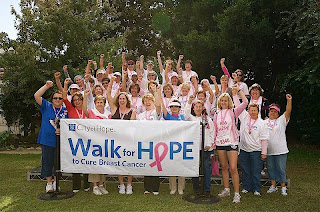Fighting cancer can be a full time job for the patient and for their families. It may entail major changes to improve one's diet, more doctor appointments, lots of reflection on life and of course, dealing with the mental stress and physical effects of disease and treatment (most commonly surgery, chemo and/or radiation, depending on the type of cancer).
There are two recommendations I give to almost all cancer patients because I believe they will benefit almost everyone with very minimal side effect and they are both free or almost free.
The two high yield recommendations are:
- Start eating a more healthy, low-inflammatory diet
- Start exercising regularly
Today, I'd like to talk about regular exercise. Consider the following:
- Multiple studies show that women with breast cancer--both currently undergoing treatment and survivors--have better levels of energy, better quality of life, better heart and lung function if they exercise. These studies show that the benefits accrue over a wide range of age groups and across different stages of cancer. In other words, almost everyone benefits.
- The exercises in the study were simple and doable. It ranged from 2x to 3x per week of exercise such as simple walking. Some fancier studies included strength training or resistance training. Some utilized certain methods such as yoga. The bottom line is that doing some form of exercise, any form, is better than not doing exercise at all.
- I also want to highlight that in some studies, patients who are concurrently undergoing chemotherapy also benefit. Sometimes, they will exercise on the morning before receiving the chemotherapy i.v. When someone is doing chemo, exercise may be the last thing on their minds because of the deep fatigue that is a side effect of chemo. Families, doctors and nurses should try their best to encourage and cheer-on the patient to "try their best" to do some form of exercise. I recall one patient who was had a lot of numbness in their hands and feet from chemo and had no motivation to do any exercise because of the profound fatigue. She's had these side effects for almost three months with seemingly no improvement. I sat with her and asked her to simply start by doing ten counts of "opening and closing" her hand every two hours and within a week or two, she started to get improvements and was very much encouraged that she started to force herself to start walking around her living room, and later on venturing outside to her garden for exercise. This story illustrates that it does not take much exercise and a little exercise can go a long way.
- Exercise also benefits men with cancer. This should not be a surprise to anyone but I wanted to be explicit about this. In this study for example, men were asked to do some simple exercise in the morning before they had radiation treatment to their prostate. The men who did the exercise had better quality of life, more energy and less side effects from the treatment compared to the men who did not deliberately do any exercise.
In subsequent articles, we will discuss about the other simple step to improve life with or life after cancer: a healthier approach to eating.

No comments:
Post a Comment